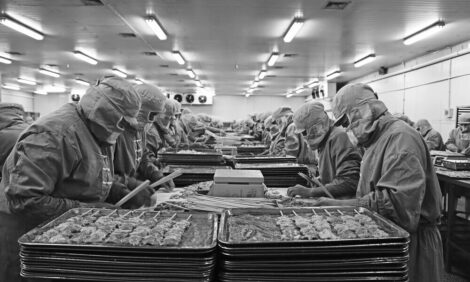



HSA Announces Award for Advances in Humane Slaughter
UK - The Humane Slaughter Association (HSA) has announced the winner of its 2012 award for significant advances in humane slaughter. The award, which recognises individuals or organisations that have made significant scientific, technical or other advances that have led to improvements in the humane slaughter of livestock, was won by the Stunning and Slaughter Group at the University of Bristol’s School of Veterinary Sciences.This year, in honour and memory of John Ace-Hopkins who won the award in 2011 and
who died in November 2011, the award was named the 'HSA John Ace-Hopkins Award
for Significant Advances in Humane Slaughter' and was presented to the Stunning and
Slaughter Group at the Veterinary School at Langford on 19 July.
The members of the group, Dr Toby Knowles, Dr Jeff Lines, Dr Mike O'Callaghan,
Dr Mohan Raj, Mr Lindsay Wilkins and Mr Steve Wotton MBE, have made major
contributions to the science underpinning humane livestock slaughter.
For over 15 years the group, led primarily by Dr Mohan Raj, have investigated the
design and operation of the poultry waterbath stunner and initially developed the use of
controlled atmosphere (CA) systems, which offered an alternative to the traditional
multi-bird electrical waterbath stunner.
Dr Becky Whay, Head of the Animal Welfare and Behaviour Group at the University of
Bristol's School of Veterinary Sciences, said: "I am delighted the group have been
recognised with this award for their work, especially as Drs Raj and O’Callaghan have
recently retired after a lifetime's work in this field.
"The group's research has led to a high welfare alternative through the use of both CA
and an electrical alternative that has real potential for the future."
One example of the group's contribution is their research into controlled atmosphere
methods that has paved the way for the commercial development of gas slaughter
systems for poultry. Although these have welfare advantages over electrical waterbath
methods, as the birds do not need to be handled or shackled, electrical systems are likely
to remain in use, and the group has undertaken key research into assessing the efficacy
of electrical stunning and into various welfare refinements for this method.
In addition to its research, the group has played a major role in training and promoting
good practice for welfare through the Masters degree in Meat Science and Technology
and the Animal Welfare Officer training courses at Bristol, and through its contributions
to the Farm Animal Welfare Committee (FAWC) and European Food Standards Agency
(EFSA) scientific reviews that have helped shape legislation.
The HSA is an independent charity that works through educational, scientific and
technical advances to improve the welfare of food animals worldwide during transport,
marketing and slaughter. For more information about this work, click here.








